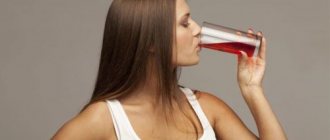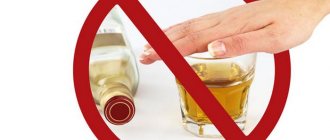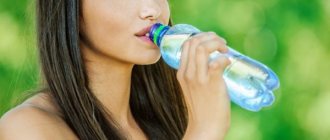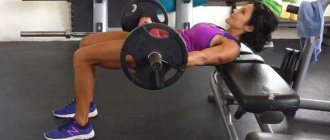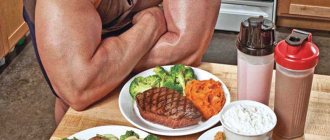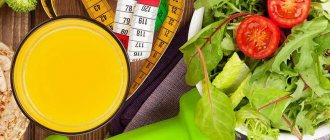Drinking regime of athletes: rules and recommendations
Drinking regime of athletes: rules and recommendations
How much, what exactly and how to drink when playing sports is the cause of controversy, research, and experiments. One thing is certain: athletes need a special drinking regimen.
A special place in healthy sports nutrition is occupied by the consumption of liquids. Sports stress causes serious changes in the human body, and proper drinking regime is one of the main ways to maintain health and performance. Experts have formulated a number of rules for the use of liquids during training and in the everyday life of athletes.
The role of water in the life of the body
Water has a colossal number of beneficial properties. It is involved in all functions of the body, without it it is impossible to maintain water-salt balance. During illness, it is not in vain that it is recommended to drink more fluid, as it can lower the temperature, thereby improving overall well-being. We will describe below what other functions water performs.
Water helps burn fat
In addition to sports training, fat burning directly depends on the amount of clean, still water you drink. It helps cleanse the kidneys and liver of toxins. In addition, a glass of water before meals reduces appetite; it contains no calories. When on a protein diet, drinking clean water is simply necessary; it helps rid the body of harmful substances. The amount of liquid you drink is directly proportional to weight loss, which is why nutritionists pay attention to your drinking regime.
Drinking regulates body temperature
Water regulates sweating. During physical training, the energy generated by the body goes not only to physical activity, but also to the generation of heat. Excess heat is sweat. When a person sweats, the body cools down. It is thanks to water that we are able to get rid of excess heat and not overheat our body. Otherwise, it would have unpleasant health consequences.
Water makes muscles work
You can and should drink during training. If the body does not have enough fluid, pain symptoms may appear. They are a consequence of dehydration. This should not be allowed due to the fact that a person may lose physical strength and muscles will weaken. In addition, water contains minerals that are involved in the functioning of the nervous system, which, in turn, controls muscle function. Everything in the body is interconnected, so you need to get into the habit of drinking a lot and often.
Drinks affect joint function
Water is involved in the formation of fluid that lubricates our joints, as well as to lubricate the vertebrae and areas near the brain. With a lack of fluid, the load on the joints and spine increases greatly and, as a result, they wear out faster. Be sure to follow a drinking regime when playing sports.
Drinking improves mental abilities
Dehydration of the body can lead to loss of strength, energy, drowsiness, mental activity decreases, and mood can deteriorate greatly. All this often happens due to lack of water. Studies have been conducted that in people engaged in mental work, a lack of fluid leads to decreased attention and general fatigue, and the efficiency factor drops. To avoid this, it is recommended to monitor the amount of clean, non-carbonated water you drink.
Water and disease prevention
Optimal water consumption can reduce the risks of certain diseases.
Preventing urolithiasis through drinking
A common kidney disease is the formation of kidney stones. Where they come from is not entirely clear. There is a possibility that people who spend most of their time in stuffy rooms are more prone to this disease. During training in the gym, you should control the amount of water you drink. It is advisable to take a break every 15-20 minutes to drink. Water is a source of prevention of kidney problems.
Preventing cancer with water
This theory has no scientific basis. However, studies have been conducted that have revealed the following: women who drink more than 4 glasses of pure water per day are less likely to suffer from breast cancer. This is controversial evidence, but it is likely due to the fact that maintaining water and salt balance reduces the risk of disrupting hormonal balance. As a result, hormones are in order, which means the risk of cancer is reduced.
Water, as we said above, can cleanse the body of harmful toxins, thereby reducing the likelihood of cancer.
Water protects against cardiovascular diseases
Moderate fluid intake can prevent heart disease, reduce pain, and normalize heartbeat.
Proper hydration before, during and after exercise: helps maintain optimal fluid balance and well-being during physical activity
The importance of drinking regime
Serious physical activity is inevitably accompanied by profuse sweating. During an intense two-hour workout, athletes lose about 3-4% of the fluid contained in the body. Moreover, a loss of 7% is already a critical level of dehydration. Loss of fluid increases blood viscosity, which, in turn, reduces metabolic rate and carries the risk of blood clots.
With sweat, the athlete loses not only fluid, but also mineral salts - primarily calcium, potassium and sodium. A lack of mineral salts can cause cramps, brittle bones and general imbalances in the body.
During the training process, a large amount of energy is consumed. To make up for these losses, it is recommended to consume liquids containing a certain amount of carbohydrates during training - they can support the athlete’s strength.
Water performs many functions in the body, the most important of which for athletes is regulating body temperature. When the body becomes dehydrated (dehydrated), endurance deteriorates and the risk of heat stroke increases.
What drinks are not recommended to drink during training?
Is it possible to drink something other than water during training? This is strongly not recommended. The exception is special drinks designed for athletes. They contain pure water with the addition of vitamins and mineral salts.
It is highly not recommended to consume various carbonated drinks during sports. Also, never take a thermos with hot tea or coffee with you to the gym or stadium. The thing is that they do not normalize the water-salt balance of the body and this reduces the effectiveness of training. After all, you need to make sure that the body completely replenishes the salts and moisture that comes out with sweat during intense training. There is a violation of the water-salt balance. Tea and coffee do not replenish salts and minerals, although they feel like they quench your thirst. It is not recommended to use them during training. Neither in winter nor in summer.
Even during outdoor sports in winter, to drink a warm drink, simply fill the thermos with water and add honey. Approximate ratio: 3 tbsp. l. honey per 1 liter of water.
What drink
Mineral water The main source of fluid recommended for athletes is mineral water. Occasionally, the use of medicinal table mineral waters, mainly alkaline, is allowed. Table mineral waters are more suitable for regular use. Mineral water perfectly quenches thirst and helps replenish the deficiency of salts in the body. It is preferable to drink still water.
Natural juices Athletes are recommended to consume fruit and vegetable juices. It is advisable to dilute juices with water (in a ratio of at least 1: 2 or stronger) so as not to irritate the mucous membranes of the digestive tract. Juices partially satisfy athletes' need for carbohydrates. Drinking juices helps maintain a normal balance of vitamins, the loss of which is high in athletes. It is recommended to add salt to vegetable juices - this will help replenish sodium salts.
Tea An excellent way to quench your thirst when playing sports is tea. The tea should be weak, unsweetened and not hot. Athletes are recommended to drink 2-3 cups of green tea per day. The antioxidant properties of green tea help neutralize free radicals, which are produced in large quantities during intense sports activities. Flavonoids contained in green tea protect cartilage tissue and improve fat absorption. Studies have shown that drinking green tea helps improve athletes' performance by 15–20%.
Coffee Surprisingly, drinking coffee is beneficial for athletes. The substances contained in this drink help reduce muscle soreness that is inevitable after intense workouts. In addition, coffee stimulates the use of body fat reserves. It is advisable for athletes to drink 1–2 cups of natural coffee per day. Coffee with milk will help meet the body's need for proteins and carbohydrates. Adding sugar to coffee is not advisable. It should be remembered that coffee has diuretic properties, so you should not abuse it.
Prohibited drinks Athletes should not drink sweet carbonated drinks, alcohol or any liquids containing preservatives, sugar, or chemical dyes.
Orange juice
Orange juice is widely known among orange juice drinkers as a low-calorie, energizing source of vitamin C, or ascorbic acid. 100 ml of orange juice contains 31 mg of this vitamin, i.e. One glass of freshly squeezed orange juice almost completely covers the body's daily need for ascorbic acid. Vitamin C makes a significant contribution to strengthening the immune system and helps fight spring fatigue.

Orange juice also boasts the presence of magnesium, potassium, calcium, vitamin B, provitamin A and other nutrients that our bodies need to maintain optimal performance.
Magnesium, for example, is involved in maintaining good blood pressure, and potassium is important for the health of the heart and blood vessels. In addition, orange juice is rich in vitamin B6, which promotes better absorption of carbohydrates and protein. In addition, this vitamin enhances the production of hemoglobin, which is responsible for the supply of oxygen to all organs and tissues of our body.
Nutritional value (per 100 ml juice):
- 44 calories;
- 8.8 g carbohydrates.
Glycemic index: 45.
How much to drink
Experts recommend increasing fluid intake compared to the physiological norm (2 liters per day) by 25–50%. Some advise athletes to consume 2.5 liters of fluid per day (depending on the intensity of training), without setting an upper limit.
Fluid intake should be increased during the hot season or if training takes place in an excessively warm room. The general opinion of professionals is that it is unacceptable for an athlete to be thirsty.
Studies by American scientists have shown that hockey players sweat up to 1–2 liters during a match. During cross-country skiing, sweating and evaporation of moisture from the skin increase sharply, even at low air temperatures.
After training
What you drink after a workout will depend on the sport you play. Bodybuilders can recommend various protein shakes that perfectly replenish spent energy. If the sport does not involve extreme physical activity, then drink water with honey. It will quench your thirst well and supply the body with useful substances.
It is also necessary to take into account that the body receives fluid not only from the inside, but also from the outside. Therefore, you should never neglect water procedures. Make it a rule to start your workout by taking a shower and finish the same way, or by swimming in a pool or pond. Showering before and after exercise clears out clogged pores and allows your body to breathe, which has a positive effect on your health.
How to drink
The cornerstone of the athletes' drinking regimen is the regimen itself: when, how much and what kind of liquid should you drink? The general rules here are universal, they are supported by most nutritionists and sports specialists.
Drinking regimen before training You need to drink before training. It is better to give preference to tea or water. There are two options: either 0.5 liters 3 hours before training, or 250 ml 1.5–2 hours and another 150 ml 15 minutes before the start of classes.
Drinking regime during training It is necessary to drink during training. During training, it is better to drink water or juices. Juices should be drunk in portions of 30–50 ml (up to 250 ml per two-hour workout). It is recommended to drink water in portions of 50–100 ml every 15 minutes of training.
Drinking regimen after training You need to drink after training. Tea, juice, and water are all suitable here. It is considered optimal to drink 150–200 ml every 15 minutes after training until your thirst is completely quenched. The total amount of liquid drunk after training is usually about 400 ml. Drinking a lot of liquid in one gulp is not recommended; gradual replenishment of fluid is healthier for the body. An easy way to find out how much fluid you've used is to step on a scale before and after your workout. Every 0.5 kg of weight lost requires drinking 2 glasses of liquid.
Losing 1 kg of body weight after exercise corresponds to losing 1 liter of fluid. However, most people only replace 50% of their fluid loss during exercise.
Therefore, opt for simple drinking water without impurities.
The main mistake that many people make when trying to rehydrate before a workout is to drink as much fluid as possible before it. Reducing the load and improving the condition will not help, but will lead to bloating, frequent urge to go to the toilet and a feeling of heaviness. But you should also not drink anything at all before training; a glass of water will be enough for the body to warm up and prepare for active training.
During training, it is most effective to drink water in small sips; this will replenish the lack of fluid without causing a feeling of heaviness. On average, the body needs about half a liter or a liter of water every one and a half to two hours. The higher the intensity of the training, the more water you need to consume. Small portions of 100-150 milliliters of clean drinking water every fifteen to twenty minutes will prevent dehydration. But you need to drink not during the process, but after giving yourself a break of one or two minutes to even out your breathing and allow your body to cool down.
It is not recommended to drink while running or other active cardio exercises. If you are overcome by thirst, you should stop, wait until your heartbeat calms down and your breathing becomes even, and only then drink. You should not drink ice water, it will not only overcool the body, but due to the large temperature difference between the water and the heated body, it can lead to the development of colds, in particular sore throats. The ideal liquid temperature is slightly below room temperature.
Isotonic drinks: to drink or not to drink?
You can often find recommendations for athletes to drink so-called isotonic drinks. The advertisement claims that such drinks most effectively restore all the body's losses without overloading it with excess fluid. The effect of isotonic drinks is based on their physicochemical properties and composition. Scientific studies have not yet confirmed the absolute effectiveness of isotonics - provided that the body is fully supplied with micronutrients, there is no need for isotonics. Isotonic drinks cannot replace regular fluids or proper nutrition. At the same time, experts advise carefully looking at the composition of such drinks - they may contain unwanted sweeteners, allergens, etc.
Expert: Galina Filippova, general practitioner, candidate of medical sciences Author: Natalia Bakatina
The material uses photographs belonging to shutterstock.com
Can you drink water while exercising?
Some fitness enthusiasts choose to refrain from drinking water during workouts, believing that this will help them lose weight faster. In addition, they “mercilessly” test their body’s resistance to dehydration even in their free time from fitness. For example, for a greater “effect” of fat burning, they often visit baths, saunas and consume various diuretics. The result, of course, is - 1-2 kilograms are lost along with water and sweat. But is this method effective and, most importantly, safe?
Refusal of water during training, frequent visits to the steam room or abuse of dehydrating drinks does not lead to the cherished goal of losing extra pounds, but to disruption of the functioning of various body systems. During intense exercise, our body loses a huge amount of moisture, as a result of which the blood thickens, the blood flow slows down, and the nutrition of tissues and cells deteriorates. The result is shortness of breath, blood clots, weakness, dizziness, etc.
- 594 594
More details - 182 182
More details
- 570 570
More details
- 222 222
More details
If you do not replenish the loss of water in the body, you can expect serious diseases in the future:
- Premature aging, dullness and dryness of the skin, the appearance of wrinkles.
- Low body tone, stress.
- Forgetfulness and the development of atherosclerosis.
- Decreased immunity.
- Problems with the gastrointestinal tract - constipation, diarrhea.
- Chronic joint pain.
Think about it, is losing weight worth such risks? Despite the fact that the lost kilograms with water during fitness will quickly return. This is clearly not the best option, and certainly not the safest.
There are other ways to fight excess weight, much more effective:
- Reduce the consumption of salt and alcoholic products - they block the removal of fluid from the body.
- Eat less sweets and sugar - foods provoke thirst.
- Include potassium-rich foods in your daily diet. They remove fluid.
Also remember this fact - dehydration directly contributes to the development of obesity. If a person limits himself in water consumption, then over time the body will begin to confuse thirst with hunger. As a result, a person will only eat more when he should have just drunk a glass of water.

